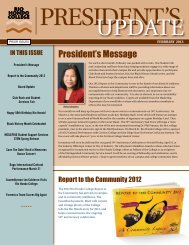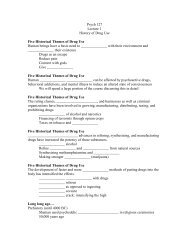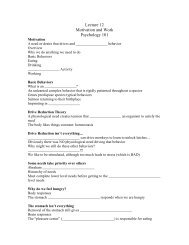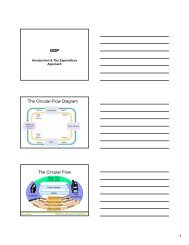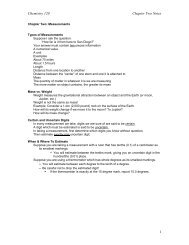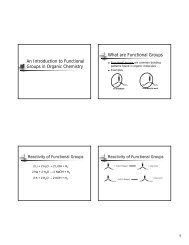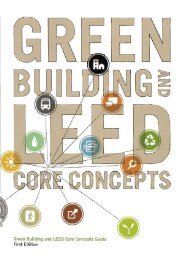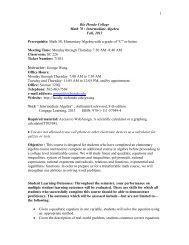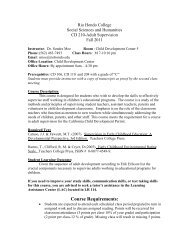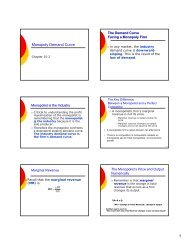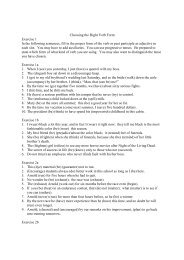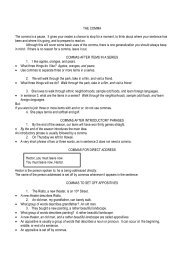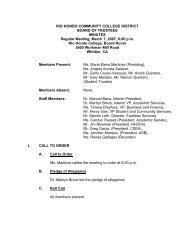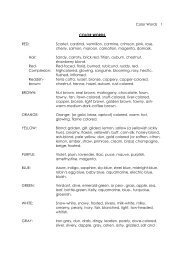Complete College Catalog 2011-2012 - Rio Hondo College
Complete College Catalog 2011-2012 - Rio Hondo College
Complete College Catalog 2011-2012 - Rio Hondo College
Create successful ePaper yourself
Turn your PDF publications into a flip-book with our unique Google optimized e-Paper software.
ELEC 064<br />
Home Technology Integration<br />
Technologies<br />
Advisory: ENGL 035 or ESL 198 or<br />
appropriate assessment; READ 023 or<br />
appropriate assessment<br />
This course presents the principles and<br />
practices of installing and maintaining<br />
home technology. Students are<br />
exposed to home lighting controls,<br />
computer networking, home security,<br />
home entertainment systems including<br />
video, data, and voice, heating<br />
ventilation and air conditioning<br />
control systems, and home systems<br />
integration. Prepares the student<br />
for Home Technology Industry<br />
certification. This course is designed<br />
for students wanting to work in the<br />
Home Technology Service industry.<br />
4 Units<br />
54 Lecture hours<br />
54 Lab hours<br />
ELEC 070<br />
Applied Telecommunications<br />
Technology<br />
Advisory: ENGL 035 or ESL 198 or<br />
appropriate assessment; READ 023 or<br />
appropriate assessment; MATH 030 or<br />
appropriate assessment<br />
This is an introductory course that<br />
will examine the theory behind<br />
present day wireless (cellular)<br />
telecommunications systems which<br />
will include an in-depth analysis of<br />
the design and installation of these<br />
systems. The course is intended for<br />
students interested in a career in the<br />
wireless telecommunications industry.<br />
Topics will include: mobile devices<br />
networks, antenna orientation, base<br />
station system, and the operation<br />
and support system associated with<br />
the wireless systems. Also presented<br />
are topics on environmental effects,<br />
governmental impact and history of<br />
wireless telecommunications.<br />
3 Units<br />
45 Lecture hours<br />
27 Lab hours<br />
ELEC 071<br />
Mobile and Wireless<br />
Communications<br />
Prerequisite: ELEC 070<br />
Advisory: ENGL 035 or ESL 198 or<br />
appropriate assessment; READ 023 or<br />
appropriate assessment; MATH 030 or<br />
appropriate assessment<br />
This is the second class of a five class<br />
program that will further examine<br />
the theory behind present day<br />
wireless (cellular) telecommunications<br />
systems. This course is designed to<br />
provide students with information<br />
and skills associated with the wireless<br />
(cellular) telecommunications<br />
industry. The course is intended<br />
for students that are interested in a<br />
new career or are currently working<br />
in the wireless telecommunications<br />
industry. Topics will include:<br />
Wireless standards and protocols and<br />
the critical issues of compatibility,<br />
internetworking, and voice/data<br />
convergence, design and integration<br />
of WCDMA/UMTS, CDMA2000,<br />
and SCDMA into existing cellular/<br />
PCS networks. Also presented are<br />
topics on RF propagation, 3G and 4G<br />
networks, and the future of wireless<br />
telecommunications.<br />
3 Units<br />
45 Lecture hours<br />
27 Lab hours<br />
ELEC 101<br />
Basic D/C Electronic Circuits and<br />
Devices<br />
Advisory: ENGL 035 or ESL 198 or<br />
appropriate assessment; READ 023 or<br />
appropriate assessment; MATH 030 or<br />
appropriate assessment<br />
Transfers to: CSU<br />
This course is an introduction to the<br />
field of D/C electricity/electronics.<br />
Emphasis is on wiring diagrams and<br />
general descriptions of the operation<br />
of electrical/electronic devices.<br />
Laboratory work provides experience<br />
with the use of meters, schematics,<br />
oscilloscopes, and common laboratory<br />
equipment.<br />
4 Units<br />
54 Lecture hours<br />
54 Lab hours<br />
ELEC 102<br />
Basic A/C Electronic Circuits and<br />
Devices<br />
Prerequisite: ELEC 101<br />
Transfers to: CSU<br />
This course is an introduction to the<br />
field of A/C electricity/electronics.<br />
Emphasis is on wiring diagrams and<br />
general descriptions of the operation<br />
of electrical/electronic devices.<br />
Laboratory work provides experience<br />
with the use of meters, schematics,<br />
oscilloscopes, and common laboratory<br />
equipment.<br />
4 Units<br />
54 Lecture hours<br />
54 Lab hours<br />
ELEC 105<br />
Computer Simulation and Fabrication<br />
of Electronic Circuits<br />
Prerequisite: ELEC 101<br />
Transfers to: CSU<br />
This course provides an introduction<br />
to the use of computer software in the<br />
simulation and fabrication of electronic<br />
circuits and printed circuit boards. It<br />
is intended for students in electronics<br />
technology as well as those currently<br />
working in the electronics industry.<br />
Using a popular educational version<br />
of circuit simulation software, the<br />
Electronics Workbench TM program<br />
suite, students will be introduced<br />
first to concepts of analog and digital<br />
circuit simulation. The modeled<br />
circuits are then processed. Fabricated<br />
and ultimately tested as prototype<br />
circuit boards. Students will learn to<br />
use a miniature computer controlled<br />
circuit board mill to produce the<br />
prototypes.<br />
2 Units<br />
18 Lecture hours<br />
54 Lab hours<br />
ELEC 108<br />
Introduction to Solid State Devices<br />
and Circuits<br />
Prerequisite: ELEC 102<br />
Transfers to: CSU<br />
The characteristics introduced are:<br />
solid state devices, BJT and FET<br />
transistors, diodes, special diodes,<br />
thyristors, and IC’s (digital and<br />
analog), typical applications of<br />
each device in amplifier, regulator,<br />
oscillator, timer and digital circuit. An<br />
introduction to AM/FM is presented.<br />
This is a course for electronic,<br />
automotive and computer technicians.<br />
4 Units<br />
54 Lecture hours<br />
54 Lab hours<br />
ELEC 109<br />
Linear, Analog Circuits and Devices<br />
Prerequisite: ELEC 108<br />
Transfers to: CSU<br />
This course builds on the foundation<br />
laid in Electronics 108, continuing the<br />
study of solid state devices and circuit<br />
with emphasis on the Integrated<br />
Circuit (IC) and applications. Discrete<br />
linear analog devices, along with<br />
integrated circuits and external<br />
circuitry are studied. IC device<br />
characteristics are developed. Input/<br />
output impedance, drift, offset, bias<br />
current, Common Mode Rejection<br />
Ratios (CMRR), Gain, Frequency<br />
Response and simple modeling<br />
are among the topics considered.<br />
Various IC devices considered such<br />
as: Operation Amplifier, Oscillators,<br />
Phase Locked Loops, Voltage<br />
Regulators, Peripheral Devices and<br />
Line Transmission circuits. Use of<br />
device data sheets and application<br />
notes will be introduced to provide<br />
training in the selection of devices for<br />
specific purposes.<br />
4 Units<br />
54 Lecture hours<br />
54 Lab hours<br />
ELEC 111<br />
Introduction to Digital Electronics<br />
Prerequisite: ELEC 108<br />
Transfers to: CSU<br />
This course is an introduction<br />
to electronic digital principles<br />
common to all areas of electronics.<br />
A comprehensive study of: Binary<br />
codes, Hexadecimal codes, Boolean<br />
algebra, Logic Circuits, Gates, Adders,<br />
TTL, CMOS and ECL families will be<br />
covered. The course is intended for<br />
people currently in the electronics<br />
industry and for Electronics Majors.<br />
4 Units<br />
54 Lecture hours<br />
54 Lab hours<br />
ELEC 208<br />
Advanced Solid State Devices and<br />
Circuits<br />
Prerequisite: ELEC 108<br />
Transfers to: CSU<br />
This course presents methods of<br />
analysis, design, and testing of common<br />
solid-state circuits. Study of design<br />
parameters and approximations for<br />
amplifiers and oscillators are included.<br />
174 / <strong>Rio</strong> <strong>Hondo</strong> <strong>College</strong> <strong>2011</strong>-<strong>2012</strong> <strong>Catalog</strong>



